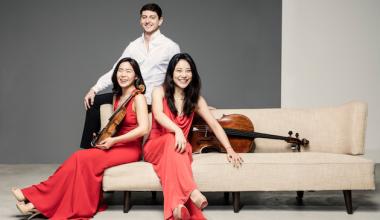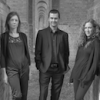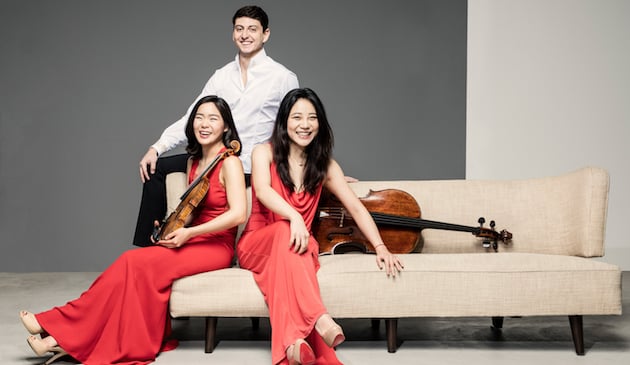
The Z.E.N. Trio made their San Francisco debut on Oct. 18 at the Herbst Theatre. Performing classic works by Schubert, Brahms, and Shostakovich, the group displayed a unique blend of virtuosity and unity.
The group combines the talents of three superb young performers to form a cohesive whole. Their name, Z.E.N., is an acronym for their first initials but also symbolizes their selfless approach towards chamber musicmaking. Pianist Zhang (Zee Zee) Zhou, violinist Esther Yoo, and cellist Narek Hakhnazaryan met as BBC Radio 3 New Generation Artists in 2015 and have cultivated impressive careers both as soloists and as a trio.
The strength of the performers was unmistakable in lyrical, sustained passages. Throughout each piece, these sections shone with intensity and emotion. The evening began beautifully with Schubert’s Notturno in E-flat Major, Op. 148, D. 897. This relatively short piece opens with the violin and cello playing in thirds over rolled piano chords, interspersed with the piano taking the melody over pizzicato accompaniment. Yoo and Hakhnazaryan achieved a wonderful tonal blend in their melodic sections, clearly communicating the appassionato marking and the lyricism of the material. Schubert developed his opening theme endlessly, weaving it through variations and arrangements that continuously shift its meaning. The piece came to a sighing conclusion with a repeat of the strings’ initial song, showing the beauty and quiet ease of simplicity.
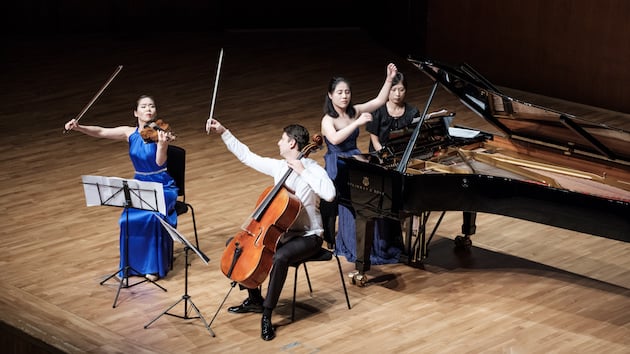
This was highlighted again during the Brahms Piano Trio in B Major, Opus 8. The Brahms suffered from issues of intonation and a lack of forward motion, although it certainly contained some lovely moments. The Adagio movement was intimate and vulnerable and created the biggest reward for the trio. Their sensitivity shone in this sustained and slow section, as it had in the Schubert. The trio clearly knows their strengths, as their encore was a luxurious arrangement of Rachmaninoff’s Vocalise, with plenty of emotional excess and romantic yearning as required by the piece.
The other movements, although strengthened by Brahms’s exceptional command of melody, felt somewhat lost. Persistent intonation issues between the strings, especially in unison melodies, tainted the Allegro con brio and Scherzo, which also showed a notable lack of energy. The final movement returned vitality to the work, moving from anxious to determined and striding confidently toward its close. Zhang Zuo’s powerful, driving piano arpeggios suitably pointed the audience toward what was to come in the Shostakovich.
Strikingly different from the previous works, Shostakovich’s Piano Trio No. 2 in E Minor, Opus 67 brought a welcome change of pace. Although his works may not sound as lyrical or pleasant as Brahms’s, he is certainly never boring. The trio featured some very characteristic gestures from the composer in its ominous low lines, endless rhythmic ostinatos, and insistent strings reiterating the melody.
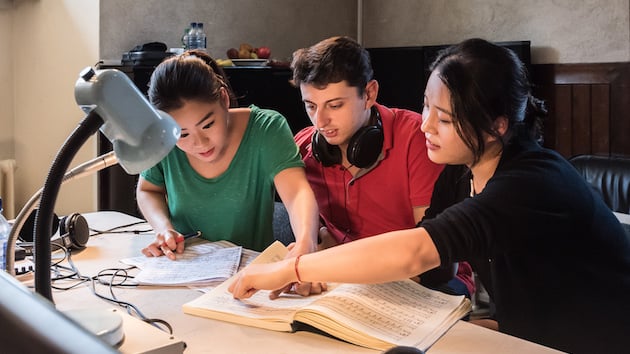
The fascinating Andante featured Hakhnazaryan playing the entrancing melody entirely in harmonics, with the violin supporting below. The piano then took over, playing at opposite ends of the keyboard, with the strings dictating a bouncing ostinato. These combinations created an eerie effect, reminding one of an otherworldly, slowly winding river.
Shostakovich, of course, developed this material rapidly, creating vastly different textures: The Allegro con brio contained qualities similar to Saint-Saëns’s Danse macabre, but was worlds away from Zuo’s commanding piano dictating the beginning of the passacaglia in the Largo. Once again, Hakhnazaryan shone with a heart-wrenching solo in this movement that created an emotional apex. The musicians were clearly giving it their all, and their emphatic playing created many remarkable moments throughout the evening.
Zuo, Yoo, and Hakhnazaryan appeared especially sensitive to the passion and complexity of their program and make an incredible team.

